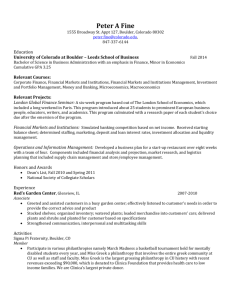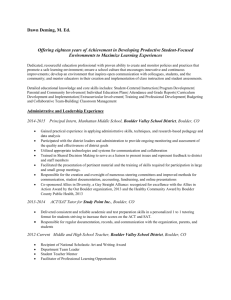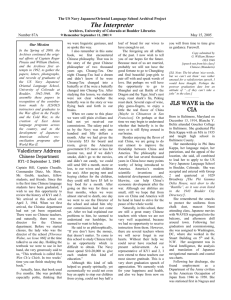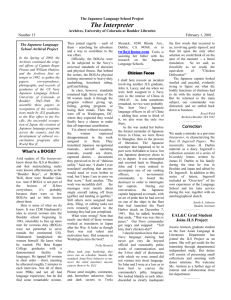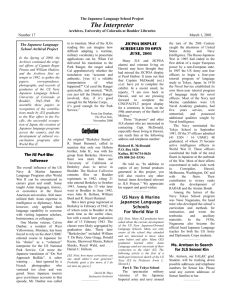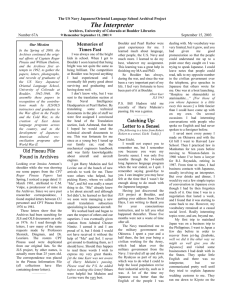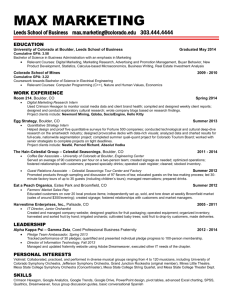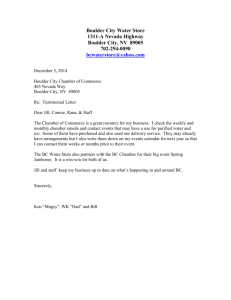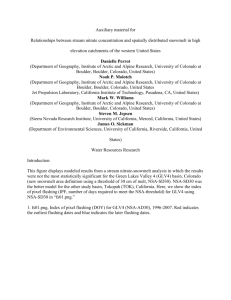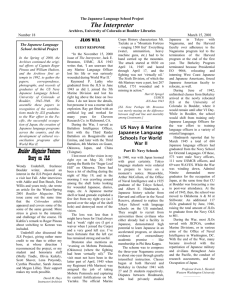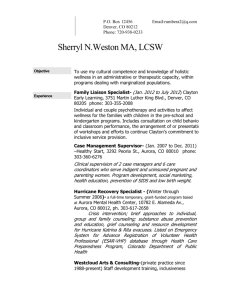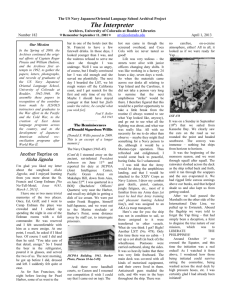The US Navy Japanese/Oriental Language School Archival Project
advertisement
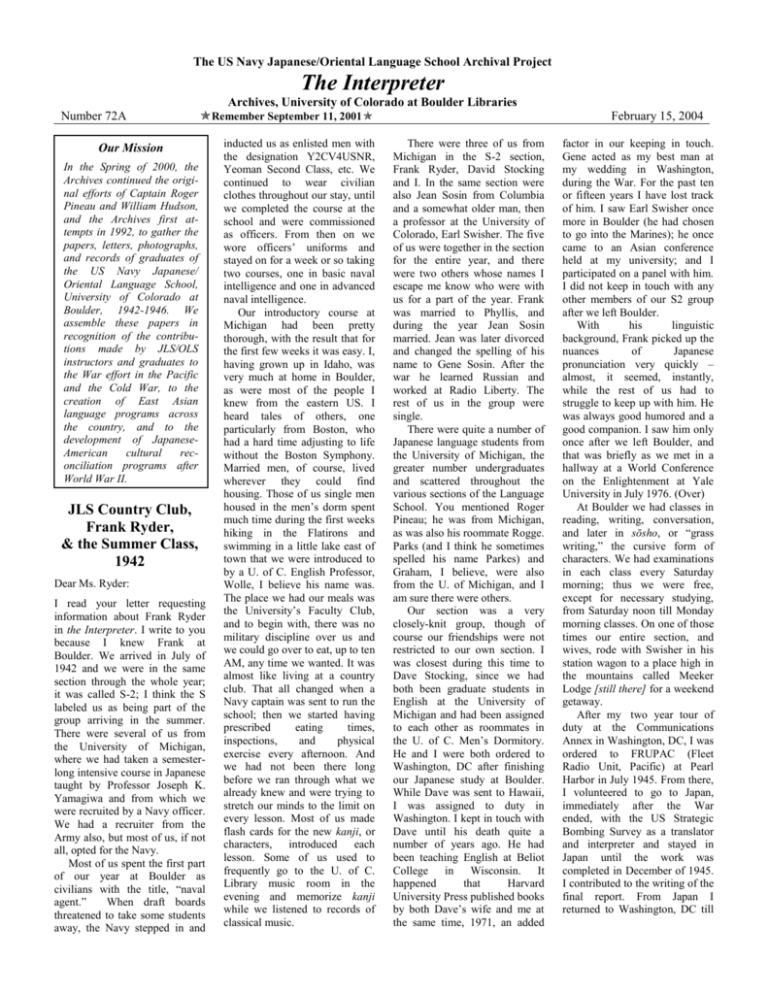
The US Navy Japanese/Oriental Language School Archival Project The Interpreter Number 72A Archives, University of Colorado at Boulder Libraries Remember September 11, 2001 Our Mission In the Spring of 2000, the Archives continued the original efforts of Captain Roger Pineau and William Hudson, and the Archives first attempts in 1992, to gather the papers, letters, photographs, and records of graduates of the US Navy Japanese/ Oriental Language School, University of Colorado at Boulder, 1942-1946. We assemble these papers in recognition of the contributions made by JLS/OLS instructors and graduates to the War effort in the Pacific and the Cold War, to the creation of East Asian language programs across the country, and to the development of JapaneseAmerican cultural reconciliation programs after World War II. JLS Country Club, Frank Ryder, & the Summer Class, 1942 Dear Ms. Ryder: I read your letter requesting information about Frank Ryder in the Interpreter. I write to you because I knew Frank at Boulder. We arrived in July of 1942 and we were in the same section through the whole year; it was called S-2; I think the S labeled us as being part of the group arriving in the summer. There were several of us from the University of Michigan, where we had taken a semesterlong intensive course in Japanese taught by Professor Joseph K. Yamagiwa and from which we were recruited by a Navy officer. We had a recruiter from the Army also, but most of us, if not all, opted for the Navy. Most of us spent the first part of our year at Boulder as civilians with the title, “naval agent.” When draft boards threatened to take some students away, the Navy stepped in and inducted us as enlisted men with the designation Y2CV4USNR, Yeoman Second Class, etc. We continued to wear civilian clothes throughout our stay, until we completed the course at the school and were commissioned as officers. From then on we wore officers’ uniforms and stayed on for a week or so taking two courses, one in basic naval intelligence and one in advanced naval intelligence. Our introductory course at Michigan had been pretty thorough, with the result that for the first few weeks it was easy. I, having grown up in Idaho, was very much at home in Boulder, as were most of the people I knew from the eastern US. I heard tales of others, one particularly from Boston, who had a hard time adjusting to life without the Boston Symphony. Married men, of course, lived wherever they could find housing. Those of us single men housed in the men’s dorm spent much time during the first weeks hiking in the Flatirons and swimming in a little lake east of town that we were introduced to by a U. of C. English Professor, Wolle, I believe his name was. The place we had our meals was the University’s Faculty Club, and to begin with, there was no military discipline over us and we could go over to eat, up to ten AM, any time we wanted. It was almost like living at a country club. That all changed when a Navy captain was sent to run the school; then we started having prescribed eating times, inspections, and physical exercise every afternoon. And we had not been there long before we ran through what we already knew and were trying to stretch our minds to the limit on every lesson. Most of us made flash cards for the new kanji, or characters, introduced each lesson. Some of us used to frequently go to the U. of C. Library music room in the evening and memorize kanji while we listened to records of classical music. There were three of us from Michigan in the S-2 section, Frank Ryder, David Stocking and I. In the same section were also Jean Sosin from Columbia and a somewhat older man, then a professor at the University of Colorado, Earl Swisher. The five of us were together in the section for the entire year, and there were two others whose names I escape me know who were with us for a part of the year. Frank was married to Phyllis, and during the year Jean Sosin married. Jean was later divorced and changed the spelling of his name to Gene Sosin. After the war he learned Russian and worked at Radio Liberty. The rest of us in the group were single. There were quite a number of Japanese language students from the University of Michigan, the greater number undergraduates and scattered throughout the various sections of the Language School. You mentioned Roger Pineau; he was from Michigan, as was also his roommate Rogge. Parks (and I think he sometimes spelled his name Parkes) and Graham, I believe, were also from the U. of Michigan, and I am sure there were others. Our section was a very closely-knit group, though of course our friendships were not restricted to our own section. I was closest during this time to Dave Stocking, since we had both been graduate students in English at the University of Michigan and had been assigned to each other as roommates in the U. of C. Men’s Dormitory. He and I were both ordered to Washington, DC after finishing our Japanese study at Boulder. While Dave was sent to Hawaii, I was assigned to duty in Washington. I kept in touch with Dave until his death quite a number of years ago. He had been teaching English at Beliot College in Wisconsin. It happened that Harvard University Press published books by both Dave’s wife and me at the same time, 1971, an added February 15, 2004 factor in our keeping in touch. Gene acted as my best man at my wedding in Washington, during the War. For the past ten or fifteen years I have lost track of him. I saw Earl Swisher once more in Boulder (he had chosen to go into the Marines); he once came to an Asian conference held at my university; and I participated on a panel with him. I did not keep in touch with any other members of our S2 group after we left Boulder. With his linguistic background, Frank picked up the nuances of Japanese pronunciation very quickly – almost, it seemed, instantly, while the rest of us had to struggle to keep up with him. He was always good humored and a good companion. I saw him only once after we left Boulder, and that was briefly as we met in a hallway at a World Conference on the Enlightenment at Yale University in July 1976. (Over) At Boulder we had classes in reading, writing, conversation, and later in sōsho, or “grass writing,” the cursive form of characters. We had examinations in each class every Saturday morning; thus we were free, except for necessary studying, from Saturday noon till Monday morning classes. On one of those times our entire section, and wives, rode with Swisher in his station wagon to a place high in the mountains called Meeker Lodge [still there] for a weekend getaway. After my two year tour of duty at the Communications Annex in Washington, DC, I was ordered to FRUPAC (Fleet Radio Unit, Pacific) at Pearl Harbor in July 1945. From there, I volunteered to go to Japan, immediately after the War ended, with the US Strategic Bombing Survey as a translator and interpreter and stayed in Japan until the work was completed in December of 1945. I contributed to the writing of the final report. From Japan I returned to Washington, DC till my release from active duty on 1 March 1946. In the fall of 1946 I was able to take up my Rhodes Scholarship to Oxford, suspended in September 1939 at the outbreak of war in Europe. The clause requiring scholars to be single had also been suspended, and I took my wife and a ten-month old son with me to Oxford and we stayed three for years, returning with an additional son and a D.Phil. (Doctor of Philosophy) degree to teach three years at the University of Washington in Seattle. I taught after that continuously at Brigham Young University, except for a year as visiting professor at the University of California at Berkeley, 1959-60, and another year as a senior Fullbright lecturer in Pakistan 1973-74. I retired in 1982. I always admired Frank Ryder and enjoyed being a classmate of his for a year at the US Navy Japanese Language School in Boulder, Colorado. I had not heard of his death until I read your letter. department at the University of British Columbia here in Vancouver. Last year I put together a brief account of my wartime service in the Pacific and in the postwar occupation of Japan for several lectures to Japanese politics students. I have had later contact with only a few Stillwater graduates like Charles Terry, a good writer on Japan, who died several years ago. I visited Gene Langston, another student who became a well-known cultural consultant in Japan, for the last time about eight years ago when he was dying from emphysema in a Japanese hospital. Unfortunately, I have no other contacts, whose current addresses I can supply. Recently, I did hear from the granddaughter of Mrs. Saibara, who was one of our teachers at Stillwater. She wanted me to identify some former students whom I had known. Edward L. Hart JLS 1943 [Ed. Note: Another fine letter from the correspondence files.] Frank C. Langdon OLS 1946 [Ed. Note: This is but a portion of his Late OLS Graduates Many Were Prior War Veterans I attended the Oriental Language School at Oklahoma Agricultural and Mechanical College at Stillwater at the very end of its run, rather than the school at Boulder. That attendance came after three and a half years at sea as a communications officer. I was on the heavy cruiser, USS Minneapolis, participating in such battles as Rabaul, Coral Sea, Midway, Tassafaranga, Lingayen Gulf and Okinawa [among the letter to us. I advised him about fellow OLS graduate, UBC emeritus and neighbor, Professor Howes, whom he may know in all regards but in a shared JLS/OLS capacity. He may not be aware of the JLS/OLS connection to fellow analysts of Japanese politics such as Burks, Ward, Morley, Elsbree, and Olson, as well as former instructor Ike. We welcome him to the group. His address is: Frank C. Langdon 4736 W. 4th Ave. Vancouver, BC Canada V6T 1C2 Langdon@interchange.ubc.ca ] seventeen battle stars the cruiser earned in the Pacific, 19421945]. After that I was briefly a translator and economic analyst in the Occupation of Japan, followed by graduate work at Harvard, and California, Berkeley and a career as a university professor in Japan, Korea, Guam, Australia, and Canada where I have taught Japanese language, as well as the politics and international relations of Japan and East Asia. Although I have been a retired professor emeritus for nearly 20 years, I still keep up ties with my colleagues in the political science Bill Hudson “Memoir” Bill Hudson is offering, through the Archives, short photocopies of his composite memoir/scrapbook (60-70 pages). Send $15.00 to: David Hays Archives University of Colorado at Boulder Campus Box 184 Boulder, Colorado, 80309-0184 Phone (303) 492-7242 Fax (303) 492-3960 Email: arv@colorado.edu
